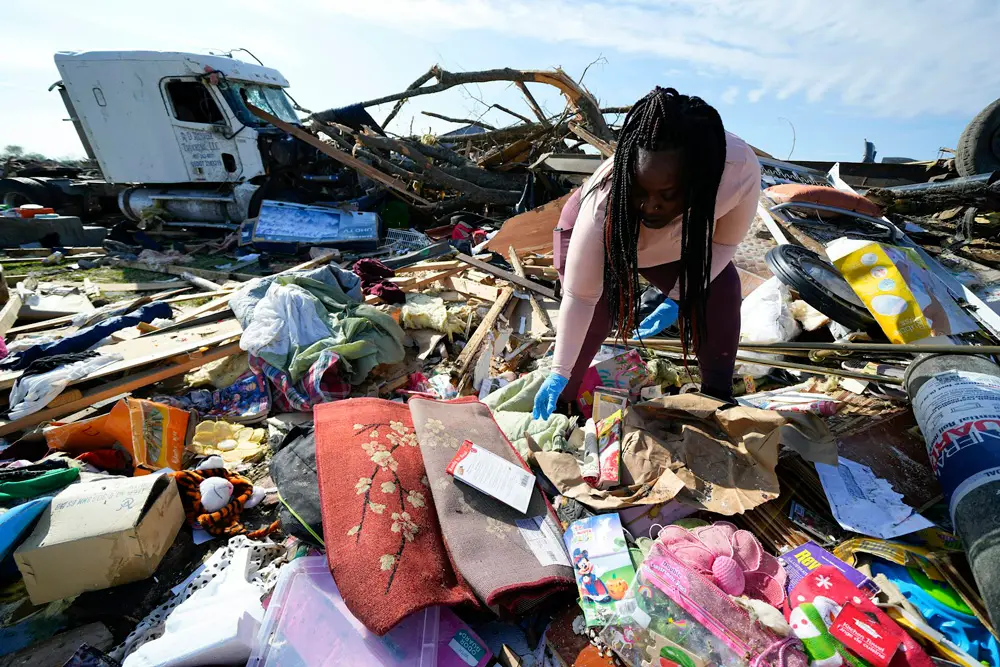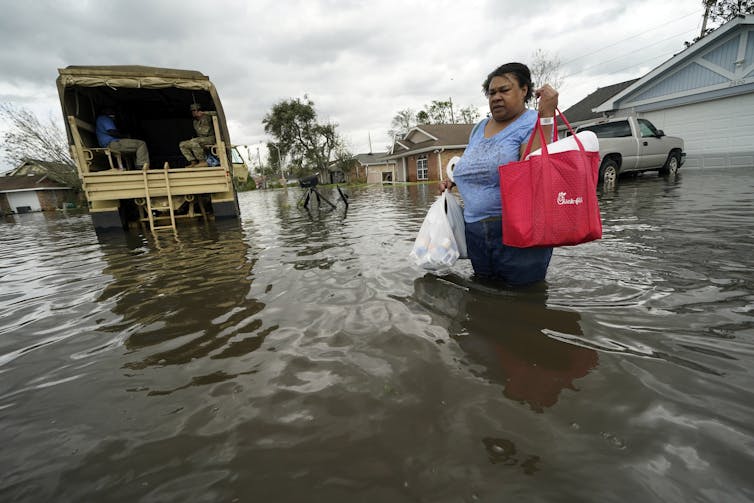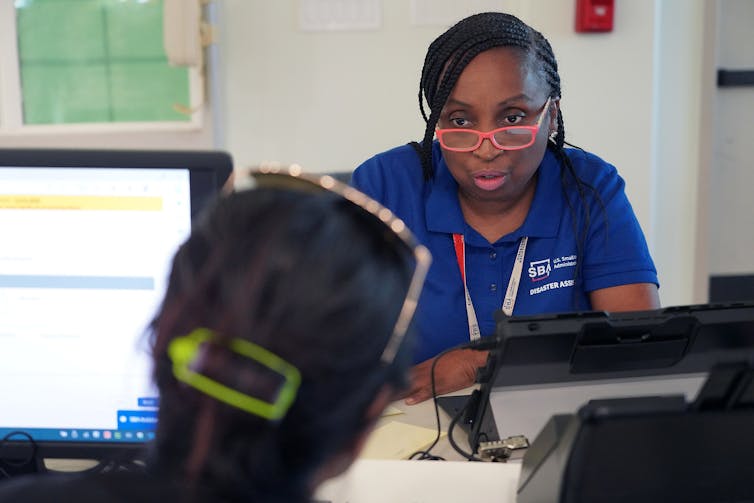
By Tricia Wachtendorf and James Kendra
People often think of disasters as great equalizers. After all, a hurricane, tornado or wildfire doesn’t discriminate against those in its path. But the consequences for those impacted are not “one-size-fits-all.”
That’s evident in the U.S. Census Bureau’s newly released results from its national household surveys showing who was displaced by disasters in 2023.
Overall, the Census Bureau estimates that nearly 2.5 million Americans had to leave their homes because of disasters in 2023, whether for a short period or much longer. However, a closer look at demographics in the survey reveals much more about disaster risk in America and who is vulnerable.
It suggests, as researchers have also found, that people with the fewest resources, as well as those who have disabilities or have been marginalized, were more likely to be displaced from their homes by disasters than other people.

AP Photo/Gerald Herbert
Decades of disaster research, including from our team at the University of Delaware’s Disaster Research Center, make at least two things crystal clear: First, people’s social circumstances – such as the resources available to them, how much they can rely on others for help, and challenges they face in their daily life – can lead them to experience disasters differently compared to others affected by the same event. And second, disasters exacerbate existing vulnerabilities.
This research also shows how disaster recovery is a social process. Recovery is not a “thing,” but rather it is linked to how we talk about recovery, make decisions about recovery and prioritize some activities over others.
Lessons from past disasters
Sixty years ago, the recovery period after the destructive 1964 Alaskan earthquake was driven by a range of economic and political interests, not simply technical factors or on need. That kind of influence continues in disaster recovery today. Even disaster buyout programs can be based on economic considerations that burden under-resourced communities.
This recovery process is made even more difficult because policymakers often underappreciate the immense difficulties residents face during recovery.
Following Hurricane Katrina, sociologist Alexis Merdjanoff found that property ownership status affected psychological distress and displacement, with displaced renters showing higher levels of emotional distress than homeowners. Lack of autonomy in decisions about how to repair or rebuild can play a role, further highlighting disparate experiences during disaster recovery.
What the Census shows about vulnerability
The 2023 census data consistently showed that socially vulnerable groups reported being displaced from their homes at higher rates than other groups.
People over 65 had a higher rate of being displaced than younger people. So did Hispanic and Black Americans, people with less than a high school education and those with low household incomes or who were struggling with employment compared to other groups. While the Census Bureau describes the data as experimental and notes that some sample sizes are small, the differences stand out and are consistent with what researchers have found.
Low-income and marginalized communities are often in areas at higher risk of flooding from storms or may lack investment in storm protection measures.
The morass of bureaucracy and conflicting information can also be a barrier to a swift recovery.

Department of Homeland Security
After Hurricane Sandy, people in New Jersey complained about complex paperwork and what felt to them like ever-changing rules. They bemoaned their housing recovery as, in researchers’ words, a “muddled, inconsistent experience that lacked discernible rationale”.
Residents who don’t know how to find information about disaster recovery assistance or can’t take time away from work to accumulate the necessary documents and meet with agency representatives can have a harder time getting quick help from federal and state agencies.
Disabilities also affect displacement. Of those people who were displaced for some length of time in 2023, those with significant difficulty hearing, seeing or walking reported being displaced at higher rates than those without disabilities.
Prolonged loss of electricity or water due to an ice storm, wildfire or grid overload during a heat emergency can force those with medical conditions to leave even if their neighbors are able to stay.
That can also create challenges for their recovery. Displacement can leave vulnerable disaster survivors isolated from their usual support systems and health care providers. It can also isolate those with limited mobility from disaster assistance.
Helping communities build resilience
Crucial research efforts are underway to better help people who may be struggling the most after disasters.
For example, our center was part of an interdisciplinary team that developed a framework to predict community resilience after disasters and help identify investments that could be made to bolster resilience. It outlines ways to identify gaps in community functioning, like health care and transportation, before disaster strikes. And it helps determine recovery strategies that would have the most impact.
Shifts in weather and climate and a mobile population mean that people’s exposure to hazards are constantly shifting and often increasing. The Coastal Hazard, Equity, Economic Prosperity, and Resilience Hub, which our center is also part of, is developing tools to help communities best ensure resilience and strong economic conditions for all residents without shortchanging the need to prioritize equity and well-being.
We believe that when communities experience disasters, they should not have to choose among thriving economically, ensuring all residents can recover and reducing risk of future threats. There must be a way to account for all three.
Understanding that disasters affect people in different ways is only a first step toward ensuring that the most vulnerable residents receive the support they need. Involving community members from disproportionately vulnerable groups to identify challenges is another. But those, alone, are not enough.
If we as a society care about those who contribute to our communities, we must find the political and organizational will to act to reduce the challenges reflected in the census and disaster research.
![]()
Tricia Wachtendorf is Professor of Sociology and Director at the Disaster Research Center, University of Delaware. James Kendra is Director of the Disaster Research Center and Professor in Public Policy & Administration at the University of Delaware.





























Pogo says
@Thoughts and prayers
https://www.google.com/search?q=2024+hurricane+season
God Bless the Child, Song by Billie Holiday
Mama may have, papa may have
But God bless the child that’s got his own
Them that’s got shall get
Them that’s not shall lose
So the bible said and it still is news
Mama may have, papa may have (mama may have, papa may have)
But God bless the child that’s got his own, that’s got his own (ooh-ooh)
Yes, the strong get smart
While the weak ones fade
Empty pockets don’t ever make the grade (ooh)
Mama may have, papa may have (ooh, ooh)
But God bless the child that’s got his own, that’s got his own (ooh, ooh)
Money, you’ve got lots of friends
They’re crowding around the door
When you’re gone and spending ends
They don’t come no more
Rich relations give crusts of bread and such
You can help yourself, but don’t take too much
Mama may have, papa may have (mama may have, papa may have)
But God bless the child that’s got his own, that’s got his own
God bless the child, the child that’s got his own
Endless Dark Money says
lol if they are in FL and their home is destroyed by natural disasters, they should be arrested for sleeping on public land. Homelessness is now illegal in Florida no matter how you got there. Protest haha that’s illegal in Florida too.
JimboXYZ says
“People over 65 had a higher rate of being displaced than younger people.”
This started with the 2020 Census, asking questions about Renting vs Owning, Financed or not. Congress (Democrat controlled at the time) was going to displace and mismanage housing for certain special interest groups. Whatever happened to the concept of protecting Seniors from being abused & taken advantage of ? Why would the Federal Government be interested in that information for rental vs ownership if they weren’t about to create financial hardships of at least the 1st 4 years of Biden. The goal from the start was to redistribue property ownership. Those fires in Hawaii, man made disasters & guess who scooped up property for pennies on the dollar ? everything happens for a reason “they” say. How unlucky would any of the displaced have to be for the last 4 years to unfold like it has ? And that’s all random ? Home Owners insurance, that tripled to unaffordable for too many. Rents & Mortgages doubled under Biden. The effect is they get to say who qualifies for special programs for home ownership, otherwise they kick those into rental, even homelessness. That didn’t happen under Trump or at least not like it has under Biden. vote wisely this time, if you were non-essential under Biden to this point, you still are non-essential. It’s you against Biden & his DC Swamp cronies.
https://www2.census.gov/programs-surveys/decennial/2020/technical-documentation/questionnaires-and-instructions/questionnaires/2020-informational-questionnaire-english_DI-Q1.pdf
https://www.prb.org/resources/u-s-2020-census-faq/
endangered species says
yes the number goes up every year but were just better at counting them now lol. has nothing to do with global trends get back to work.